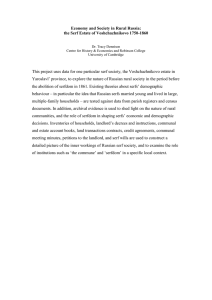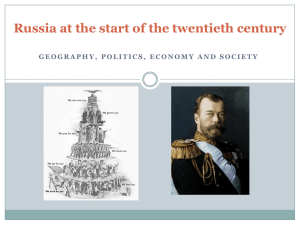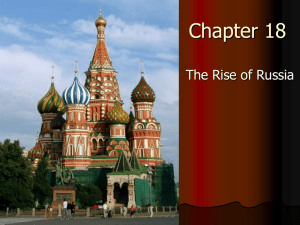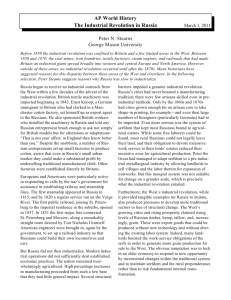The Emancipation of the Serfs 1861
advertisement
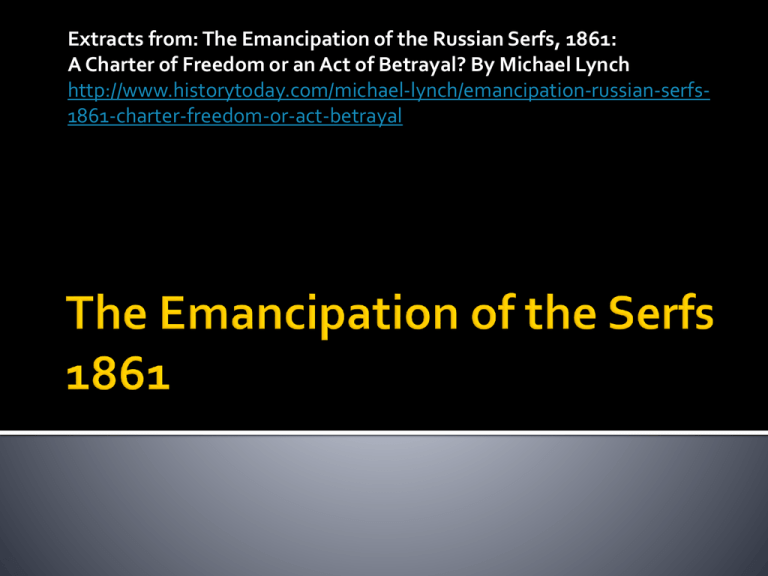
Extracts from: The Emancipation of the Russian Serfs, 1861: A Charter of Freedom or an Act of Betrayal? By Michael Lynch http://www.historytoday.com/michael-lynch/emancipation-russian-serfs1861-charter-freedom-or-act-betrayal “The landowner did not own the serf. This contrasted with the system in the USA where the negro slaves were chattels; that is, they were regarded in law as the disposable property of their masters. In Russia the traditional relationship between lord and serf was based on land. It was because he lived on his land that the serf was bound to the lord”. “The purpose behind the granting of such powers to the Russian dvoriane (nobility of landowners) in 1649 had been to make the nobles dependent on, and therefore loyal to, the tsar. They were to express that loyalty in practical form by serving the tsar as military officers or public officials. In this way the Romanov emperors built up Russia’s civil bureaucracy and the armed services as bodies of public servants who had a vested interest in maintaining the tsarist state”. “the serfs made up just over a third of the population and formed half of the peasantry. They were most heavily concentrated in the central and western provinces of Russia”. “…… long before the 19th century, the feudal system had been abandoned in western Europe as it moved into the commercial and industrial age. Imperial Russia underwent no such transition..….. many Russians, of all ranks and classes, had come to accept that reform of some kind was unavoidable if their nation was to progress”. “As often happened in Russian history, it was war that forced the issue. The Russian state had entered the Crimean War in 1854 with high hopes of victory. Two years later it suffered a heavy defeat at the hands of the Allied armies of France, Britain and Turkey. The shock to Russia was profound. The nation had always prided itself on its martial strength. Now it had been humiliated……Serfdom was manifestly not working. It had failed to provide the calibre of soldier Russia needed”. ‘the existing condition of owning souls cannot remained unchanged. It is better to begin to destroy serfdom from above than to wait until that time when it begins to destroy itself from below’. (Alexander II) “The compensation that the landowners received was far in advance of the market value of their property. They were also entitled to decide which part of their holdings they would give up. Unsurprisingly, they kept the best land for themselves. The serfs got the leftovers. The data shows that the landlords retained two-thirds of the land while the peasants received only one-third. So limited was the supply of affordable quality land to the peasants that they were reduced to buying narrow strips that proved difficult to maintain and which yielded little food or profit”. “Moreover, while the landowners were granted financial compensation for what they gave up, the peasants had to pay for their new property. Since they had no savings, they were advanced 100 per cent mortgages, 80 per cent provided by the State bank and the remaining 20 by the landlords. This appeared a generous offer, but as in any loan transaction the catch was in the repayments. The peasants found themselves saddled with redemption payments that became a lifelong burden that then had to be handed on to their children”.
